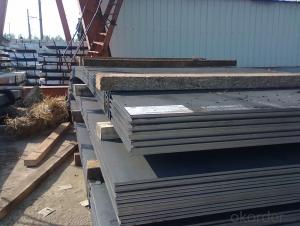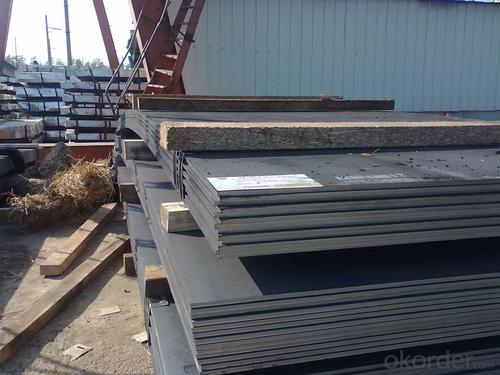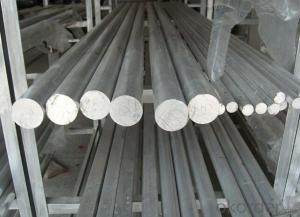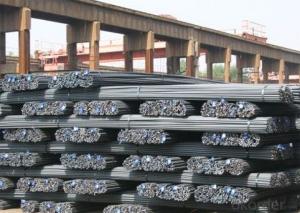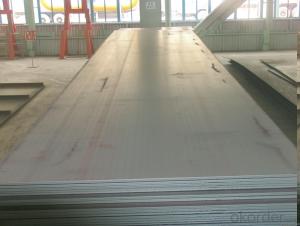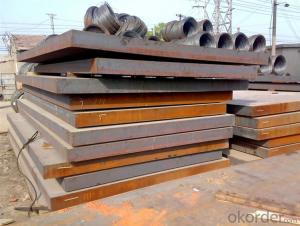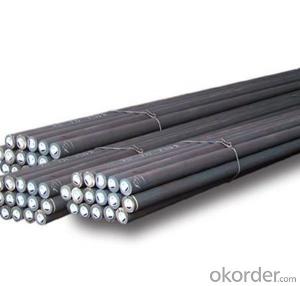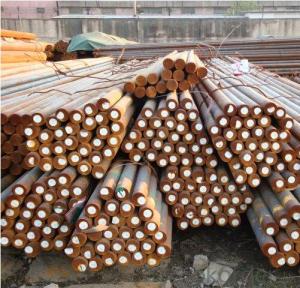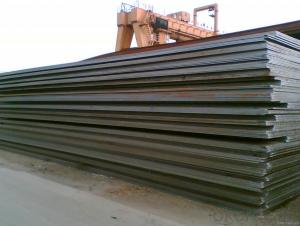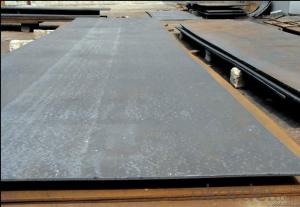Special Steel Cr12MoV Cold Working Die Steel Plate
- Loading Port:
- China main port
- Payment Terms:
- TT OR LC
- Min Order Qty:
- 25 m.t.
- Supply Capability:
- 10000 m.t./month
OKorder Service Pledge
OKorder Financial Service
You Might Also Like
Specification
The details of our Steel
1. Produce Standard: as the GB, AISI, ASTM, SAE, EN, BS, DIN, JIS Industry Standard
2. Produce processes: Smelt Iron -EAF smelt Billet - ESR smelt Billet -Hot rolled or forged get the steel round bar and plate
3. Heat treatment:
Normalized / Annealed / Quenched+Tempered
4. Quality assurance:
All order we can received Third party inspection, You can let SGS, BV,.. and others test company test and inspect our products before Goods shipping.
Product information
Chemical Composition(%)
Country | Standard | C | Si | Mn | Cr | Mo | V | S | P | W |
GB | C12MoV | 1.45-1.70 | ≤0.40 | ≤0.40 | 11.00-12.5 | 0.40-0.60 | 0.15-0.30 | ≤0.030 | ≤0.030 | |
DIN | 1.2601 | 1.55-1.75 | 0.25-0.40 | 0.20-0.40 | 11.00-12.0 | 0.50-0.70 | 0.10-0.50 | ≤0.030 | ≤0.030 | 0.40-0.60 |
Available Size
Rolled flat steel | 12-90mm×205-610mm×L |
Forged flat steel | 100-300mm×400-600mm×L |
Heat Treatment
Item | Temperature℃ | Hardness |
Anneal | 850-880 | ≤255HB |
Quenching | No.1:980-1040 | 60-63HRC |
No.2:1050-1130 | 42-50HRC | |
Tempering | No.1:200-300(1) | 57-60HRC |
No.2:200-300(2-3) | 58-62HRC |
Applications: Suitable for various complicated cold working dies with high precision and long lifetime,such as punching dies,cold extrusion dies,thread rolling dies,screw plates,cold extrusion dies,and precise measuring devices
Product show

Workshop show

- Q: What is the impact of manganese in special steel alloys?
- Manganese plays a crucial role in special steel alloys and has a significant impact on their properties and performance. Special steel alloys, also known as high-strength or low-alloy steels, are designed to have enhanced mechanical properties, such as increased strength, durability, and resistance to wear and corrosion. Manganese, along with other alloying elements like nickel, chromium, and molybdenum, is added to steel to achieve these desired characteristics. One of the key impacts of manganese in special steel alloys is its ability to enhance the hardenability of the steel. Manganese promotes the formation of fine-grained structures during the solidification and cooling process, which leads to improved strength and toughness. This property is particularly important in applications where the steel needs to withstand heavy loads, shocks, or extreme temperatures. Furthermore, manganese helps in reducing the brittleness of steel and improves its weldability. It forms a solid solution with iron, preventing the formation of harmful iron sulfides that can cause brittleness and reduce the steel's ability to be welded. This makes manganese an essential element in steels used for fabrication, construction, and automotive industries, where welding is a common practice. Manganese also contributes to the steel's resistance to corrosion and oxidation. It forms a protective oxide layer on the surface of the steel, preventing the penetration of oxygen and moisture. This property is particularly beneficial in industries where the steel is exposed to harsh environments or corrosive substances, such as marine applications, chemical processing plants, or oil and gas refineries. Additionally, manganese improves the hardenability and wear resistance of steel, making it suitable for manufacturing tools, machinery parts, and cutting edges. It increases the steel's ability to be heat treated, allowing for desired hardness and strength to be achieved through processes like quenching and tempering. In summary, manganese has a significant impact on special steel alloys, enhancing their hardenability, weldability, toughness, corrosion resistance, and wear resistance. Its addition to steel alloys enables the production of high-strength and durable materials that can withstand demanding applications and environments.
- Q: How does special steel contribute to the energy generation industry?
- The energy generation industry heavily relies on special steel to enhance the efficiency, reliability, and safety of different components and equipment used in power plants. A crucial application of special steel is in the construction of turbine blades and generator rotors, where these parts are exposed to extreme temperatures, pressures, and mechanical stresses. Specifically designed superalloys can withstand these harsh conditions, ensuring the durability and effectiveness of these critical components. By utilizing special steel, power plants can operate at higher temperatures and pressures, ultimately leading to improved energy efficiency and power output. Special steel is also indispensable in the manufacturing of boilers and heat exchangers. These components are exposed to corrosive environments and high temperatures. Stainless steels and other special steel alloys possess excellent corrosion resistance properties, enabling them to endure these challenging conditions in power plant operations. The longevity and dependability of these components are thus ensured, resulting in reduced maintenance costs and downtime. Additionally, special steel is essential in the construction of transmission and distribution infrastructure. Steel cables and conductors are employed to transmit electricity over long distances. Special steel alloys offer the necessary strength and conductivity required for efficient power transmission. Furthermore, steel is used in the construction of support structures such as towers and poles, guaranteeing the stability and reliability of the electrical grid. Moreover, special steel plays a vital role in the production of nuclear energy. Nuclear power plants demand materials that can withstand extreme temperatures, high levels of radiation, and corrosive environments. Special steel alloys, including stainless steels and nickel-based alloys, are specifically engineered to meet these stringent requirements. They provide the necessary strength, radiation resistance, and corrosion resistance, ensuring the safe and efficient operation of nuclear reactors. In conclusion, special steel is an integral component of the energy generation industry. Its unique properties and capabilities contribute significantly to the efficiency, reliability, and safety of various components and equipment used in power plants. By utilizing special steel, power plants can enhance energy efficiency, reduce maintenance costs, and ensure the longevity and performance of critical infrastructure. Ultimately, this supports the sustainable and dependable generation of electricity.
- Q: What are the factors that affect the fatigue strength of special steel?
- The factors that affect the fatigue strength of special steel include the composition of the steel, the heat treatment process used, the presence of impurities or defects, the surface finish, the loading conditions, and the operating environment.
- Q: How does special steel contribute to improving product reliability?
- Special steel contributes to improving product reliability in several ways. Firstly, special steel is known for its exceptional strength and durability, making it less prone to wear and tear or structural failures. This enhanced strength ensures that products made with special steel can withstand heavy loads, extreme temperatures, and harsh working conditions, thereby increasing their reliability and lifespan. Additionally, special steel is often engineered to have superior resistance to corrosion, rust, and other forms of degradation, minimizing the risk of damage or malfunction due to environmental factors. Moreover, the precise composition and manufacturing processes used in special steel production enable tighter tolerances and improved dimensional accuracy, resulting in products that fit together more seamlessly and function with greater precision. Overall, the use of special steel in various industries helps to enhance product reliability, ensuring that customers can trust in the quality and performance of the end products they use.
- Q: Can special steel be used in renewable energy applications?
- Yes, special steel can indeed be used in renewable energy applications. Special steel refers to high-performance alloys that possess specific properties such as high strength, corrosion resistance, and temperature resistance. These properties make special steel an excellent choice for various components used in renewable energy technologies. In wind energy, for example, special steel is used in the manufacturing of wind turbine components such as rotor shafts, gears, and bearings. The high strength and fatigue resistance of special steel ensure the durability and reliability of these components, allowing them to withstand harsh environmental conditions and prolonged use. Special steel is also utilized in solar power systems. Solar panels require sturdy and corrosion-resistant frames to support and protect the delicate photovoltaic cells. Special steel provides the necessary strength and resistance to weathering, ensuring the longevity of solar panels in outdoor installations. Furthermore, in hydropower applications, special steel is employed in the construction of turbines, penstocks, and other components that are exposed to high-pressure and corrosive environments. The excellent resistance to erosion, cavitation, and corrosion of special steel ensures the efficient and reliable operation of hydropower plants. Additionally, special steel finds applications in the manufacturing of batteries used in renewable energy storage systems. The high strength and thermal stability of special steel are crucial for the containment and protection of battery cells, ensuring their safe operation. In summary, special steel is well-suited for renewable energy applications due to its exceptional mechanical properties and resistance to corrosion and high temperatures. Its utilization in wind turbines, solar panels, hydropower systems, and energy storage technologies enhances the performance and reliability of these renewable energy solutions.
- Q: What are the different methods for improving the impact resistance of special steel?
- Special steel can be made more impact resistant through various methods. These methods fall into three main categories: heat treatment, alloying, and surface treatments. Heat treatment is a commonly used method to improve impact resistance. It involves carefully heating and cooling the steel to change its microstructure. Tempering and quenching are the two primary heat treatment processes used for this purpose. Tempering involves heating the steel to a specific temperature and then slowly cooling it. This helps to relieve internal stresses and increase toughness. On the other hand, quenching involves rapidly cooling the steel after heating it to a high temperature. This results in a hardened microstructure, which enhances impact resistance. Alloying is another method to enhance the impact resistance of special steel. By adding specific elements to the base steel, its properties can be improved. For instance, elements like manganese, nickel, or chromium can be added to increase toughness and impact resistance. These alloying elements modify the steel's microstructure, resulting in enhanced strength and resistance to deformation. Surface treatments are used to provide a protective layer on the steel's surface, thereby improving impact resistance. A commonly employed surface treatment is case hardening, which introduces carbon or nitrogen into the outer layer of the steel. This creates a hard surface while maintaining a tough core, resulting in improved impact resistance. Another surface treatment method is shot peening, where the steel surface is bombarded with small particles under high pressure. This induces compressive stresses in the surface layer, enhancing fatigue and impact resistance. In summary, the impact resistance of special steel can be improved through different methods, including heat treatment, alloying, and surface treatments. These methods can be applied individually or in combination to enhance the steel's mechanical properties, making it more resistant to impact and deformation.
- Q: Is special steel suitable for electrical and electronic applications?
- Yes, special steel can be suitable for electrical and electronic applications. Special steel refers to steel alloys that have been specifically designed to possess certain properties or characteristics that make them suitable for particular applications. In the case of electrical and electronic applications, special steel can offer various advantages. One of the key requirements for electrical and electronic applications is high electrical conductivity. While steel is not typically known for its electrical conductivity, certain special steel alloys can be engineered to have improved electrical conductivity. For example, stainless steel can be alloyed with elements such as nickel or copper to enhance its electrical conductivity, making it suitable for applications where electrical current needs to flow efficiently. Another important factor for electrical and electronic applications is magnetic properties. Some special steel alloys exhibit excellent magnetic properties, making them ideal for applications such as transformers, motors, and generators. These alloys can possess high magnetic permeability, low coercivity, and low hysteresis losses, which are crucial for efficient energy transfer and minimal power loss. Furthermore, special steel can also provide excellent corrosion resistance, which is essential in electrical and electronic equipment that may be exposed to moisture or harsh environments. Stainless steel, for instance, is highly resistant to corrosion, ensuring the longevity and reliability of the equipment. In summary, special steel can be suitable for electrical and electronic applications when it possesses the necessary electrical conductivity, magnetic properties, and corrosion resistance. By choosing the appropriate special steel alloy, manufacturers can ensure the performance, durability, and reliability of electrical and electronic equipment.
- Q: What are the properties of magnetic steel?
- Magnetic steel is characterized by its ability to attract and hold a magnetic field. It has a high magnetic permeability, allowing it to easily magnetize and demagnetize. Magnetic steel also exhibits high coercivity, meaning it has a strong resistance to losing its magnetization. Additionally, it possesses high electrical conductivity and is often used in various applications such as transformers, motors, and magnetic storage devices.
- Q: Can special steel be used in the solar panel manufacturing industry?
- Yes, special steel can be used in the solar panel manufacturing industry. It is commonly used for the frames and supports of solar panels due to its high strength, durability, and corrosion resistance properties. Special steel helps to ensure the structural integrity and longevity of solar panels, making it an essential material in the industry.
- Q: Is special steel suitable for marine applications?
- Yes, special steel is suitable for marine applications. Special steel, also known as marine grade stainless steel, is specifically designed to withstand the harsh conditions of marine environments. It offers excellent resistance to corrosion, especially in the presence of saltwater, which makes it highly suitable for various marine applications. Special steel contains a higher percentage of chromium and nickel compared to standard steel grades, which enhances its corrosion resistance properties. Additionally, it is often alloyed with molybdenum, titanium, or other elements to further improve its resistance to pitting, crevice corrosion, and chloride-induced stress corrosion cracking. Marine applications require materials that can withstand high levels of moisture, saltwater exposure, and environmental factors like temperature variations and wave impact. Special steel meets these requirements by providing exceptional strength, durability, and corrosion resistance. Some common marine applications that benefit from special steel include shipbuilding, offshore oil and gas platforms, marine equipment and machinery, marine pipelines, and marine architecture and structures. Special steel is also used in the construction of naval vessels, submarines, and offshore wind farms. In conclusion, special steel is highly suitable for marine applications due to its superior corrosion resistance properties, durability, and strength. It effectively withstands the harsh conditions of marine environments and ensures the longevity and reliability of marine structures and equipment.
Send your message to us
Special Steel Cr12MoV Cold Working Die Steel Plate
- Loading Port:
- China main port
- Payment Terms:
- TT OR LC
- Min Order Qty:
- 25 m.t.
- Supply Capability:
- 10000 m.t./month
OKorder Service Pledge
OKorder Financial Service
Similar products
Hot products
Hot Searches
Related keywords
